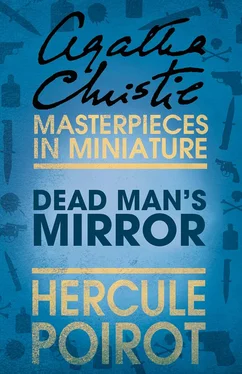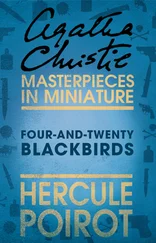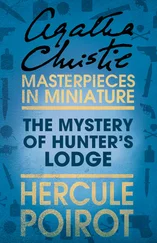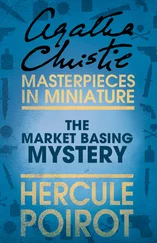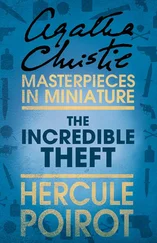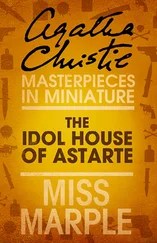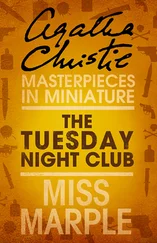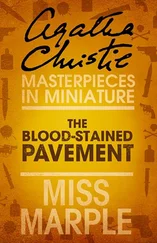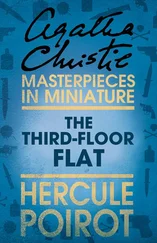Agatha Christie - The Dead Man’s Mirror - A Hercule Poirot Short Story
Здесь есть возможность читать онлайн «Agatha Christie - The Dead Man’s Mirror - A Hercule Poirot Short Story» — ознакомительный отрывок электронной книги совершенно бесплатно, а после прочтения отрывка купить полную версию. В некоторых случаях можно слушать аудио, скачать через торрент в формате fb2 и присутствует краткое содержание. Жанр: unrecognised, на английском языке. Описание произведения, (предисловие) а так же отзывы посетителей доступны на портале библиотеки ЛибКат.
- Название:The Dead Man’s Mirror: A Hercule Poirot Short Story
- Автор:
- Жанр:
- Год:неизвестен
- ISBN:нет данных
- Рейтинг книги:3 / 5. Голосов: 1
-
Избранное:Добавить в избранное
- Отзывы:
-
Ваша оценка:
- 60
- 1
- 2
- 3
- 4
- 5
The Dead Man’s Mirror: A Hercule Poirot Short Story: краткое содержание, описание и аннотация
Предлагаем к чтению аннотацию, описание, краткое содержание или предисловие (зависит от того, что написал сам автор книги «The Dead Man’s Mirror: A Hercule Poirot Short Story»). Если вы не нашли необходимую информацию о книге — напишите в комментариях, мы постараемся отыскать её.
The Dead Man’s Mirror: A Hercule Poirot Short Story — читать онлайн ознакомительный отрывок
Ниже представлен текст книги, разбитый по страницам. Система сохранения места последней прочитанной страницы, позволяет с удобством читать онлайн бесплатно книгу «The Dead Man’s Mirror: A Hercule Poirot Short Story», без необходимости каждый раз заново искать на чём Вы остановились. Поставьте закладку, и сможете в любой момент перейти на страницу, на которой закончили чтение.
Интервал:
Закладка:
The Dead Man’s Mirror
A Hercule Poirot Short Story
by Agatha Christie

Copyright Copyright The Dead Man’s Mirror Related Products About the Publisher
Published by HarperCollins Publishers Ltd 1 London Bridge Street London SE1 9GF
www.harpercollins.co.uk
Copyright © 2008 Agatha Christie Ltd.
Cover design © HarperCollins Publishers 2014
All rights reserved under International and Pan-American Copyright Conventions. By payment of the required fees, you have been granted the nonexclusive, nontransferable right to access and read the text of this e-book onscreen. No part of this text may be reproduced, transmitted, downloaded, decompiled, reverse engineered, or stored in or introduced into any information storage and retrieval system, in any form or by any means, whether electronic or mechanical, now known or hereinafter invented, without the express written permission of HarperCollins e-books.
Ebook Edition © JUNE 2014 ISBN 9780007560165
Version: 2017-04-13
HarperCollinsPublishers has made every reasonable effort to ensure that any picture content and written content in this ebook has been included or removed in accordance with the contractual and technological constraints in operation at the time of publication .
Contents
Cover
Title Page The Dead Man’s Mirror A Hercule Poirot Short Story by Agatha Christie
Copyright
The Dead Man’s Mirror
Related Products
About the Publisher
Dead Man’s Mirror
‘Dead Man’s Mirror’ is an expanded version of the story ‘The Second Gong’ which was first published in the USA in Ladies’ Home Journal , June 1932, then in The Strand , July 1932.
The flat was a modern one. The furnishings of the room were modern, too. The armchairs were squarely built, the upright chairs were angular. A modern writing-table was set squarely in front of the window, and at it sat a small, elderly man. His head was practically the only thing in the room that was not square. It was egg-shaped.
M. Hercule Poirot was reading a letter:
Station: Whimperley.
Telegrams: Hamborough St John.
Hamborough Close,
Hamborough St Mary,
Westshire.
September 24th, 1936.
M. Hercule Poirot.
Dear Sir, – A matter has arisen which requires handling with great delicacy and discretion. I have heard good accounts of you, and have decided to entrust the matter to you. I have reason to believe that I am the victim of fraud, but for family reasons I do not wish to call in the police. I am taking certain measures of my own to deal with the business, but you must be prepared to come down here immediately on receipt of a telegram. I should be obliged if you will not answer this letter.
Yours faithfully,
GERVASE CHEVENIX-GORE.
The eyebrows of M. Hercule Poirot climbed slowly up his forehead until they nearly disappeared into his hair.
‘And who, then,’ he demanded of space, ‘is this Gervase Chevenix-Gore?’
He crossed to a bookcase and took out a large, fat book.
He found what he wanted easily enough.
Chevenix-Gore, Sir Gervase Francis Xavier, 10th Bt. cr. 1694; formerly Captain 17th Lancers; b. 18th May, 1878; e.s. of Sir Guy Chevenix-Gore, 9th Bt., and Lady Claudia Bretherton, 2nd. d. of 8th Earl of Wallingford. S. father, 1911; m. 1912, Vanda Elizabeth, e.d. of Colonel Frederick Arbuthnot, q.v.; educ. Eton. Served European War, 1914–18. Recreations: travelling, big-game hunting. Address: Hamborough St Mary, Westshire, and 218 Lowndes Square, S.W.1. Clubs: Cavalry. Travellers.
Poirot shook his head in a slightly dissatisfied manner. For a moment or two he remained lost in thought, then he went to the desk, pulled open a drawer and took out a little pile of invitation cards.
His face brightened.
‘ A la bonne heure! Exactly my affair! He will certainly be there.’
A duchess greeted M. Hercule Poirot in fulsome tones.
‘So you could manage to come after all, M. Poirot! Why, that’s splendid.’
‘The pleasure is mine, madame,’ murmured Poirot, bowing.
He escaped from several important and splendid beings – a famous diplomat, an equally famous actress and a well-known sporting peer – and found at last the person he had come to seek, that invariably ‘also present’ guest, Mr Satterthwaite.
Mr Satterthwaite twittered amiably.
‘The dear duchess – I always enjoy her parties … Such a personality , if you know what I mean. I saw a lot of her in Corsica some years ago …’
Mr Satterthwaite’s conversation was apt to be unduly burdened by mentions of his titled acquaintances. It is possible that he may sometimes have found pleasure in the company of Messrs. Jones, Brown or Robinson, but, if so, he did not mention the fact. And yet, to describe Mr Satterthwaite as a mere snob and leave it at that would have been to do him an injustice. He was a keen observer of human nature, and if it is true that the looker-on knows most of the game, Mr Satterthwaite knew a good deal.
‘You know, my dear fellow, it is really ages since I saw you. I always feel myself privileged to have seen you work at close quarters in the Crow’s Nest business. I feel since then that I am in the know, so to speak. I saw Lady Mary only last week, by the way. A charming creature – pot-pourri and lavender!’
After passing lightly on one or two scandals of the moment – the indiscretions of an earl’s daughter, and the lamentable conduct of a viscount – Poirot succeeded in introducing the name of Gervase Chevenix-Gore.
Mr Satterthwaite responded immediately.
‘Ah, now, there is a character, if you like! The Last of the Baronets – that’s his nickname.’
‘ Pardon , I do not quite comprehend.’
Mr Satterthwaite unbent indulgently to the lower comprehension of a foreigner.
‘It’s a joke, you know – a joke . Naturally, he’s not really the last baronet in England – but he does represent the end of an era. The Bold Bad Baronet – the mad harum-scarum baronet so popular in the novels of the last century – the kind of fellow who laid impossible wagers and won ’em.’
He went on to expound what he meant in more detail. In younger years, Gervase Chevenix-Gore had sailed round the world in a windjammer. He had been on an expedition to the Pole. He had challenged a racing peer to a duel. For a wager he had ridden his favourite mare up the staircase of a ducal house. He had once leapt from a box to the stage and carried off a well-known actress in the middle of her rôle.
The anecdotes of him were innumerable.
‘It’s an old family,’ went on Mr Satterthwaite. ‘Sir Guy de Chevenix went on the first crusade. Now, alas, the line looks like coming to an end. Old Gervase is the last Chevenix-Gore.’
‘The estate, it is impoverished?’
‘Not a bit of it. Gervase is fabulously wealthy. Owns valuable house property – coalfields – and in addition he staked out a claim to some mine in Peru or somewhere in South America, when he was a young man, which has yielded him a fortune. An amazing man. Always lucky in everything he’s undertaken.’
‘He is now an elderly man, of course?’
‘Yes, poor old Gervase.’ Mr Satterthwaite sighed, shook his head. ‘Most people would describe him to you as mad as a hatter. It’s true, in a way. He is mad – not in the sense of being certifiable or having delusions – but mad in the sense of being abnormal. He’s always been a man of great originality of character.’
Читать дальшеИнтервал:
Закладка:
Похожие книги на «The Dead Man’s Mirror: A Hercule Poirot Short Story»
Представляем Вашему вниманию похожие книги на «The Dead Man’s Mirror: A Hercule Poirot Short Story» списком для выбора. Мы отобрали схожую по названию и смыслу литературу в надежде предоставить читателям больше вариантов отыскать новые, интересные, ещё непрочитанные произведения.
Обсуждение, отзывы о книге «The Dead Man’s Mirror: A Hercule Poirot Short Story» и просто собственные мнения читателей. Оставьте ваши комментарии, напишите, что Вы думаете о произведении, его смысле или главных героях. Укажите что конкретно понравилось, а что нет, и почему Вы так считаете.
